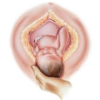Understanding Preterm Labor: Insights from Ayurveda
Understanding Preterm Labor: Insights from Ayurveda, defined as the onset of labor before 37 weeks of gestation, is a significant concern for expectant mothers and healthcare providers alike. It can lead to premature birth, which poses various health risks for the infant. In recent years, there has been a growing interest in alternative and complementary therapies, including Ayurveda, to support maternal health and manage the risks associated with preterm labor. This blog explores the Ayurvedic perspective on preterm labor, its causes, preventive measures, and potential remedies.
What is Preterm Labor?

Preterm labor occurs when a pregnant woman begins to experience contractions and cervical changes before reaching full term (37 weeks). Factors contributing to preterm labor can be multifaceted, including:
- Medical Conditions: Issues such as hypertension, diabetes, and infections can increase the risk.
- Lifestyle Factors: Poor nutrition, substance abuse, and high levels of stress are also linked to preterm labor.
- Physical Factors: A previous history of preterm labor, multiple pregnancies, or cervical incompetence may predispose a woman to deliver early.
Recognizing the symptoms of preterm labor, such as regular contractions, lower back pain, and changes in vaginal discharge, is crucial for timely medical intervention.
The Ayurvedic Perspective
Ayurveda, a holistic healing system that originated in India over 5,000 years ago, emphasizes balance among the body, mind, and spirit. It offers a unique lens through which to view health and wellness, focusing on prevention and the treatment of imbalances.
Dosha Imbalance and Preterm Labor
According to Ayurveda, every individual has a unique constitution known as “Prakriti,” determined by the three doshas: Vata, Pitta, and Kapha. An imbalance in these doshas can lead to health issues, including preterm labor.
- Vata Dosha: Associated with movement and change, an excess of Vata can lead to anxiety, restlessness, and stress, which may trigger preterm labor.
- Pitta Dosha: Related to heat and metabolism, an excess of Pitta can lead to inflammation and irritability, which might also contribute to premature contractions.
- Kapha Dosha: Linked to stability and structure, a deficiency in Kapha can result in weak tissues and support, potentially leading to complications.
By assessing the dosha imbalances, Ayurvedic practitioners can create personalized treatment plans to support pregnant women and help mitigate the risk of preterm labor.
Causes of Preterm Labor in Ayurveda
Ayurveda identifies several root causes of preterm labor, which can be categorized into physical, emotional, and environmental factors:
1. Physical Causes
- Weakness in Uterine Support: Poor nutrition and lifestyle choices can weaken the body’s tissues, affecting the uterus’s ability to carry the pregnancy to term.
- Hormonal Imbalances: Ayurvedic texts suggest that imbalances in hormones can lead to premature contractions.
- Chronic Health Issues: Pre-existing conditions, if not managed, can exacerbate stress on the body during pregnancy.
2. Emotional Causes
- Stress and Anxiety: Emotional disturbances can aggravate Vata dosha, leading to physical manifestations such as contractions.
- Unresolved Trauma: Past traumas can affect a woman’s mental health during pregnancy, increasing the risk of preterm labor.
3. Environmental Factors
- Pollution and Toxins: Exposure to environmental toxins can disrupt the body’s natural balance.
- Socioeconomic Conditions: Factors like financial stress and lack of support can contribute to an unstable emotional state.
Ayurvedic Preventive Measures
Prevention is key in Ayurveda, and several lifestyle and dietary recommendations can help maintain balance during pregnancy, potentially reducing the risk of preterm labor.
1. Diet
A balanced diet is essential for the health of both mother and baby. Ayurvedic dietary recommendations include:
- Nourishing Foods: Incorporate warm, cooked meals with whole grains, healthy fats, and plenty of fruits and vegetables. Foods like ghee, nuts, seeds, and dairy can nourish the body.
- Avoiding Stimulants: Minimize caffeine, spicy foods, and processed sugars, which can aggravate Pitta and Vata doshas.
- Hydration: Drink adequate water and herbal teas, such as ginger or chamomile, which can soothe the digestive system and promote relaxation.
2. Lifestyle
- Yoga and Pranayama: Gentle yoga and breathing exercises can help reduce stress and strengthen the body. Poses like Viparita Karani (legs-up-the-wall pose) can promote relaxation.
- Adequate Rest: Prioritize sleep and rest to rejuvenate the body and mind.
- Routine: Establishing a daily routine can bring stability and predictability, calming Vata dosha.
3. Emotional Well-being
- Mindfulness and Meditation: Practices such as meditation can help manage stress and anxiety, promoting emotional balance.
- Support System: Surround yourself with supportive family and friends to foster a nurturing environment.
Ayurvedic Remedies for Preterm Labor
If a pregnant woman shows signs of preterm labor, Ayurveda offers several remedies that can be integrated into her care plan, always under the guidance of a qualified practitioner.
1. Herbal Remedies
- Ashwagandha: Known for its adaptogenic properties, ashwagandha can help reduce stress and support hormonal balance.
- Shatavari: This herb is traditionally used to support female reproductive health and may help strengthen the uterine tissues.
- Ginger: Ginger can alleviate nausea and digestive issues while promoting overall wellness.
2. Massage and Abhyanga
Abhyanga, or Ayurvedic oil massage, can be beneficial for pregnant women. Using warm, nourishing oils like sesame or almond oil can promote relaxation and improve circulation, reducing stress and discomfort.
3. Aromatherapy
Essential oils such as lavender and chamomile can be used in diffusers or during massage to create a calming environment. However, it’s crucial to consult with an expert to ensure safety during pregnancy.
Conclusion
Preterm labor is a complex issue influenced by various physical, emotional, and environmental factors. Ayurveda offers a holistic approach that focuses on prevention, balance, and overall well-being. By understanding the unique needs of each individual and addressing potential imbalances, Ayurvedic practices can support pregnant women in reducing the risk of preterm labor.
While Ayurveda can complement conventional care, it is essential for expectant mothers to work closely with healthcare providers to monitor their health and the health of their baby. By integrating Ayurvedic principles with modern medicine, women can empower themselves to have a healthier and more balanced pregnancy experience.
In summary, embracing Ayurvedic wisdom can provide valuable insights and tools for pregnant women, fostering an environment of health and harmony as they navigate the beautiful journey of motherhood.








Leave a reply